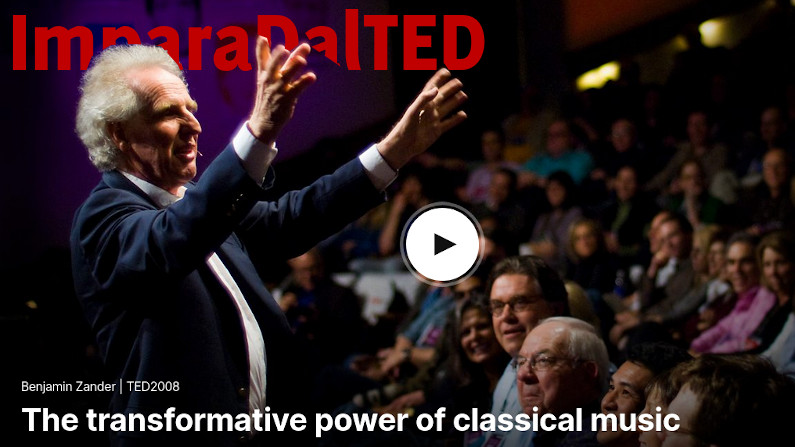Questo episodio di #ImparaDalTED è diverso dai precedenti, con Benjamin (Ben) Zander dal suo intervento del 2008. Imparerai da lui qualche trucco per fare presentazioni di successo e nel contempo puoi goderti un poco di musica classica (che non guasta mai).
L’invito è sempre quello, parti guardando il video del suo ted talk.
Non è la prima volta che menziono Zander o accenno a questo video, oggi proviamo ad esaminare alcuni punti specifici.
Aprire con una storia
Lo avrai notato subito, i primi 25 secondi sono una storia. Divertente. E che funziona benissimo per introdurre il suo tema.
Probably a lot of you know the story of the two salesmen who went down to Africa in the 1900s. They were sent down to find if there was any opportunity for selling shoes, and they wrote telegrams back to Manchester. And one of them wrote, “Situation hopeless. Stop. They don’t wear shoes.” And the other one wrote, “Glorious opportunity. They don’t have any shoes yet.”
Hai mai aperto con una storia? Quale potresti usare coerente con l’argomento delle tue presentazioni? Ha un pizzico di humour?
Rendere un’idea un esperienza
Dopo circa un minuto Zander fa un parallelo con un bambino che studia pianoforte. Questa volta però anziché limitarsi a raccontare la storia Ben la fa vivere al pubblico sedendosi al piano. Questo pezzo serve anche per introdurre il concetto di pianista a una chiappa portato poi all’interno di un’azienda.
You know, a gentleman was once watching a presentation I was doing, when I was working with a young pianist. He was the president of a corporation in Ohio. I was working with this young pianist, and said, “The trouble with you is you’re a two-buttock player. You should be a one-buttock player.” I moved his body while he was playing. And suddenly, the music took off. It took flight. The audience gasped when they heard the difference. Then I got a letter from this gentleman. He said, “I was so moved. I went back and I transformed my entire company into a one-buttock company.”
La cosa migliore che si può fare in questi casi è spostare il pubblico in un ruolo attivo. L’ascolto del bambino che suona è un’esperienza sensoriale, e come tale coinvolge l’audience.
Cinque minuti dopo l’esperienza continua, questa volta con un pezzo di Chopin, in uno spettacolare intreccio di musica e spiegazioni.
Ben Zander e l’umorismo
L’intera presentazione è costellata di umorismo, il pubblico ride 25 volte nello spazio di 15 minuti, eppure non si tratta di uno spettacolo di cabaret. Ma ridere fa bene alla platea ed anche all’oratore che viene ascoltato con più interesse.
people who never listen to classical music. It’s just simply not part of your life. You might hear it like second-hand smoke at the airport …
Imagine if Martin Luther King had said, “I have a dream. Of course, I’m not sure they’ll be up to it.”
Queste sono solo un paio delle battute che hai ascoltato durante la presentazione. Nota però che non ve ne sono negli ultimi due minuti…
Chiudi con il tuo messaggio
La conclusione è il succo del messaggio di Zander, le possibilità che offre la musica classica e per estensione la possibilità per noi di cavalcare nuove opportunità. Nota la chiusura del cerchio con la storia in apertura.
So now, I have one last thought, which is that it really makes a difference what we say — the words that come out of our mouth. I learned this from a woman who survived Auschwitz, one of the rare survivors. She went to Auschwitz when she was 15 years old. And … And her brother was eight, and the parents were lost. And she told me this, she said, “We were in the train going to Auschwitz, and I looked down and saw my brother’s shoes were missing. I said, ‘Why are you so stupid, can’t you keep your things together for goodness’ sake?'” The way an elder sister might speak to a younger brother. Unfortunately, it was the last thing she ever said to him, because she never saw him again. He did not survive. And so when she came out of Auschwitz, she made a vow. She told me this. She said, “I walked out of Auschwitz into life and I made a vow. And the vow was, “I will never say anything that couldn’t stand as the last thing I ever say.” Now, can we do that? No. And we’ll make ourselves wrong and others wrong. But it is a possibility to live into.
L’arte della possibilità (e di parlare in pubblico).










Commenti recenti